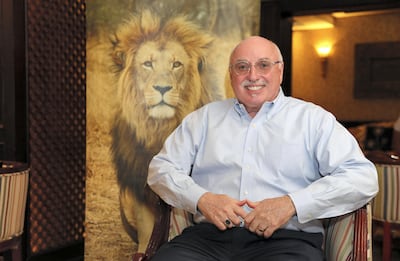Arabic speakers are needed to help fight the online sale of exotic animals in the Middle East, the International Fund of Animal Welfare has said.
Azzedine Downes, the IFAW's chief executive, said dealers were changing the names of ivory, pangolin and animal parts to make them harder to detect when searching social media.
“When translated into Arabic, they become even harder to track. So, we need Arabic speakers in the region to help report these items when they are seen for sale,” Mr Downes said.
“Internally, we are discussing ways and mechanisms to implement our Disrupt Wildlife Cybercrime programme in the Mena region,” Mr Downes said.
“We have started with Morocco, where our team of Arabic and French speakers are currently monitoring and reporting the wildlife trafficked online.”

Mr Downes said he saw a major change in the approach towards exotic pets in the UAE.
"Just walking around markets here I have seen falcons, but no tigers or other big cats openly for sale.
"One of the big things we are looking at now is cybercrime and what is happening online.
"We want to bring the countries in the Gulf together to have a united approach to wildlife trafficking."
Conservationists say the smuggling of cheetahs from the Horn of Africa into the Gulf is on the rise.
Charities such as the Cheetah Conservation Fund have developed relationships with governments in East Africa to shut down suspected routes.
One of those routes is from Somaliland into the Middle East, but also through war-torn Yemen where border controls can be difficult to monitor.
Mr Downes said the war in Yemen is creating a vacuum in which dealers operate freely.
The IFAW implemented the Horn of Africa Wildlife Enforcement Network in an attempt to stop the trafficking of animals through the region.
A cheetah trafficking workshop brought law enforcement in Ethiopia, Djibouti, Somalia and Somaliland together, to develop anti-poaching methods.
Mr Downes hopes a similar network could work in the Gulf.
Meanwhile, although the IFAW has undercover operatives monitoring the illegal wildlife trade in Yemen and Somalia, increasing turmoil is making it difficult to work on training programmes with the relevant authorities.
It is now focusing on Ethiopia, from where animals are being smuggled into south-western Saudi Arabia.
Since 2011, the CCF helped with the confiscation, care and placement of 49 cheetahs in East Africa.
And in August last year, two smugglers were charged with wildlife trafficking offences in Somaliland and sentenced to three years in prison.
Mr Downes hopes to work with poverty-stricken communities in the region with IFAW education programmes.
“We know live animals are being trafficked through Djibouti and into Yemen, where they are then moved to Saudi Arabia and the UAE,” he said.
“There is very little we can do in Yemen, and we are seeing more animals being taken from the wild for this market from Kenya, Ethiopia and Somalia – including areas where we have not seen this kind of activity before.
“It makes monitoring wildlife trafficking very difficult as some areas are too dangerous to monitor effectively.”
A 2018 review on smuggling through air transport networks revealed the UAE had the third-highest number of trafficking cases worldwide between 2009 and 2017.
Seizures at Dubai airports included endangered animals and animal products, or at further points along the trafficking supply chain heading for Asia.
Fewer than 7,000 cheetahs are believed to exist in the wild.
An investigation by The National found 34 cheetahs had been offered for sale in the UAE through Instagram since 2016.
“Social media raises interest in these animals, and also encourages support for sanctuaries. That is not always the best approach,” said Mr Downes, who was in the UAE last week handing out awards for a "Roots and Shoots" conservation programme in schools.
“Most people don’t realise those sanctuaries can become breeding farms that then feed the industry.
“One of the biggest projects IFAW is involved in is educating people at the source of trafficking routes about the long-term impact of this behaviour,” he said.


